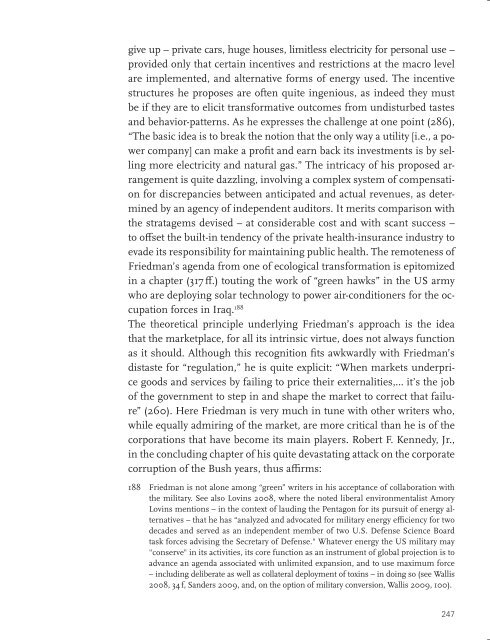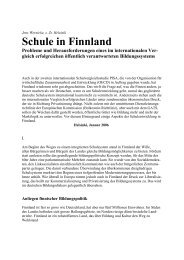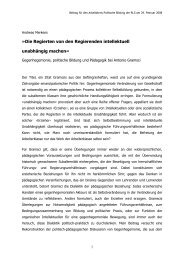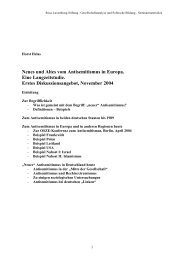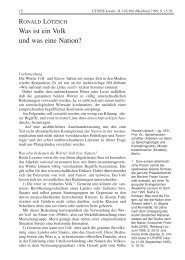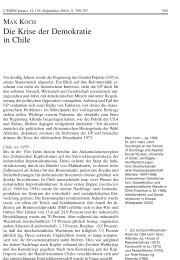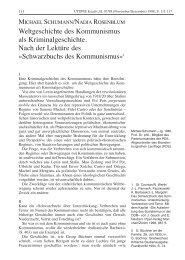Grünen Kapitalismus - Rosa-Luxemburg-Stiftung
Grünen Kapitalismus - Rosa-Luxemburg-Stiftung
Grünen Kapitalismus - Rosa-Luxemburg-Stiftung
Erfolgreiche ePaper selbst erstellen
Machen Sie aus Ihren PDF Publikationen ein blätterbares Flipbook mit unserer einzigartigen Google optimierten e-Paper Software.
give up – private cars, huge houses, limitless electricity for personal use –<br />
provided only that certain incentives and restrictions at the macro level<br />
are implemented, and alternative forms of energy used. The incentive<br />
structures he proposes are often quite ingenious, as indeed they must<br />
be if they are to elicit transformative outcomes from undisturbed tastes<br />
and behavior-patterns. As he expresses the challenge at one point (286),<br />
“The basic idea is to break the notion that the only way a utility [i.e., a power<br />
company] can make a profit and earn back its investments is by selling<br />
more electricity and natural gas.” The intricacy of his proposed arrangement<br />
is quite dazzling, involving a complex system of compensation<br />
for discrepancies between anticipated and actual revenues, as determined<br />
by an agency of independent auditors. It merits comparison with<br />
the stratagems devised – at considerable cost and with scant success –<br />
to offset the built-in tendency of the private health-insurance industry to<br />
evade its responsibility for maintaining public health. The remoteness of<br />
Friedman’s agenda from one of ecological transformation is epitomized<br />
in a chapter (317 ff.) touting the work of “green hawks” in the US army<br />
who are deploying solar technology to power air-conditioners for the occupation<br />
forces in Iraq. 188<br />
The theoretical principle underlying Friedman’s approach is the idea<br />
that the marketplace, for all its intrinsic virtue, does not always function<br />
as it should. Although this recognition fits awkwardly with Friedman’s<br />
distaste for “regulation,” he is quite explicit: “When markets underprice<br />
goods and services by failing to price their externalities,… it’s the job<br />
of the government to step in and shape the market to correct that failure”<br />
(260). Here Friedman is very much in tune with other writers who,<br />
while equally admiring of the market, are more critical than he is of the<br />
corporations that have become its main players. Robert F. Kennedy, Jr.,<br />
in the concluding chapter of his quite devastating attack on the corporate<br />
corruption of the Bush years, thus affirms:<br />
188 Friedman is not alone among “green” writers in his acceptance of collaboration with<br />
the military. See also Lovins 2008, where the noted liberal environmentalist Amory<br />
Lovins mentions – in the context of lauding the Pentagon for its pursuit of energy alternatives<br />
– that he has “analyzed and advocated for military energy efficiency for two<br />
decades and served as an independent member of two U.S. Defense Science Board<br />
task forces advising the Secretary of Defense." Whatever energy the US military may<br />
"conserve" in its activities, its core function as an instrument of global projection is to<br />
advance an agenda associated with unlimited expansion, and to use maximum force<br />
– including deliberate as well as collateral deployment of toxins – in doing so (see Wallis<br />
2008, 34 f, Sanders 2009, and, on the option of military conversion, Wallis 2009, 100).<br />
247


